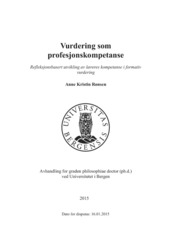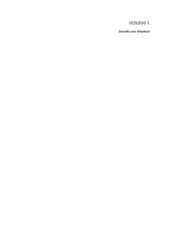| dc.description.abstract | International research considers formative assessment strategies as important determinants for students’ learning (Black & Wiliam, 2003; Brookhart, 2008; Hargreaves, 2005; Hayward, 2010; Sadler, 1989). It is common to use the phrase ‘assessment for learning’ to describe the idea behind formative assessment, and one of the key concepts in this form of assessment is feedback (Hattie & Timperley, 2007; Havnes, Smith, Dysthe, & Ludvigsen, 2012; Timperley, Parr, & Bertanees, 2009; Wiliam, 2011b). When the students receive feedback they are given the opportunity to adjust their learning activity in the direction pointed out by the feedback. Formative assessment forms teaching as well as learning, as teachers adjust their teaching practice in light of the information collected by the assessment. Thus it becomes assessment for the teacher’s as well as the students’ learning (Black & Wiliam, 2009; Timperley, 2011). This makes formative assessment crucial at all levels of the educational system. The growing concern about teachers’ assessment competence has repeatedly been confirmed in light of international tests where Norwegian students score below average. It has also been criticized that school teachers are not prepared to meet new demands made by the school authorities concerning the increasing role assessment plays in teaching at all levels. By following a professional development project focusing on assessment competencies for teachers, the current thesis examines how teachers re-shape and mold their practice when they work reflectively to increase their competence. The overarching research question was: what characterizes teachers’ professional development within assessment when performed through reflection? To enlighten different angles of the questions, I asked three sub-questions: (1) What influences and facilitates reflection over time when it is used for professional development in assessment? (2) What characterizes the process of professional development in assessment? (3) What types of communicative interaction can be found in student–teacher assessment dialogues? Each of the three sub-questions is addressed in a corresponding article. The project involved nine teachers working with students between the ages of nine and thirteen. The teachers where located at two schools and participated voluntarily. Thus the respondents and their contexts were above average interested in assessment and developing their competence within this area. The three studies were all small scale, qualitative studies, and to answer the questions raised, I collected different types of data. To identify development in the teachers’ assessment competence, I directed the attention to the teachers’ understanding and perceptions of themselves as teachers. The teachers participated in regular meetings with the research team and the principals, and these meetings were recorded. The teachers also participated in written online discussions and reflections. I transcribed and categorized the written and oral discussions and reflections to examine how the teachers described their development of assessment competence. The goal was to examine if any change had occurred in the way the teachers preformed their assessment in practice; studies of classrooms and observation of interaction between teachers and their students were important. Lessons were video recorded and field notes from classroom observations were written down and systematically analyzed. The data collection took place within a period of two and a half years. The analysis shows how the participants established a climate for competence development and a change of prevailing practice. The process materialized in three chronological phases which are called the preparatory phase, the theorizing phase and the explorative phase. The thesis affirms that if substantial change is to happen it is vital that the three phases are allowed to evolve. The context in which the assessment competence developed can be characterized by what Rommetveit (1972) calls intersubjectivity. This concept is used as a framework for explaining how mutual understanding continuously evolved between the participants. Intersubjectivity turned out to be an important condition for enhancing both the assessment competence and the indicated change in practice. In the course of the project, the participants became aware of the significance of the teachers taking charge of their own professional development, with special attention paid to developing assessment competence. The changes in classroom practice appeared in the third phase. Technical and theoretical knowledge was then combined with the teachers’ ability intuitively to interpret interaction with the students and react to their shifting needs for support in the learning process. In a small-scale, qualitative research project like this, no large generalizations can be made. Still the study shows how long-term, professional development processes amongst teachers develop. It also points out some aspects to keep in mind before, during and also after initiating such projects. The current study examined the implementation of a professional development project focusing on assessment; however, the model can be adapted to other areas and subjects relevant to teachers’ professional development. | en_US |

